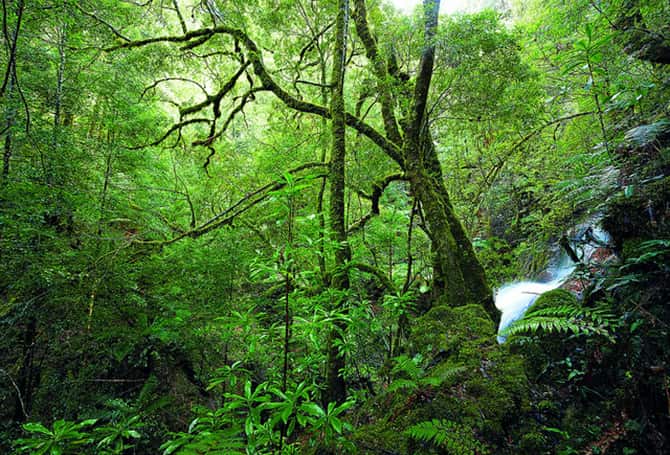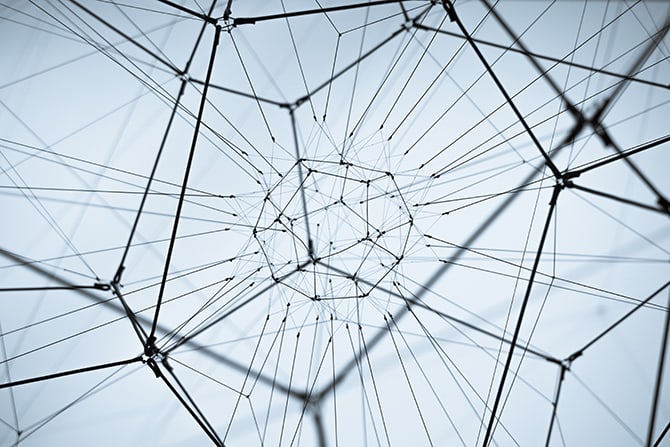What Do We Mean By “Everything Is Connected”?
With our conference now a little over two weeks away (get your tickets now, people, before they sell out!), I thought it would be a good time to quickly talk a little more about what we mean by its title: Everything is Connected.
The idea of the whole conference is to give us an opportunity to talk deeply about what a vision of a radical and popular green politics looks like – a politics which can actually address the huge crises we face, from climate change to technology change, from extreme inequality to the extreme right, and be popular enough to win.
To me, it all comes down to connection.
It is in re-finding connection to each other, to nature, to democracy, that we find solutions to all our challenges, and it is in rebuilding those connections that we make our politics real and popular.
And, importantly, connection is a deeply green idea. It’s an idea that we find in ecology, in the world all around us. And it is an idea that sets our politics apart from others in positive, inspiring ways.

So many of the problems across our society are driven by disconnection. We’ve been disconnecting from nature, of course, since we first built cities and started leaving the land in large numbers, but through the Industrial Revolution, the Enlightenment, the Reformation and capitalism, we have completely amputated ourselves from it.
We have constructed a cultural reality that sets us, as humans, apart from – and above – nature.
We have lost sight of the natural world. We’ve lost our vocabulary of it, our capacity to describe it.
Then how can we mourn its loss? We have to reclaim our place within nature. Instead of fighting to protect nature, we have to see ourselves as nature protecting ourselves.

At the same time, we are more and more disconnected from each other. Technological connectivity is one thing – society and community are another altogether.
Our capitalist culture tells us we are individuals rather than a community, consumers rather than citizens. It tells us that greed is good, and that altruism doesn’t even exist.
We have to overcome this, by rebuilding community, by bringing people together, by demonstrating and leading with compassion and generosity and communal spirit. And by fighting the commercialisation and privatisation of public space and public domains wherever we can.

And, of course, as everything from rising civil disobedience to Catalonia to Brexit to Trump show, we are disconnected from democracy. Our governments no longer work for us; they no longer play a constructive or supportive role in our lives. And people the world over are desperately seeking to reclaim that.
Some are doing so from the left. Too many are doing it from the far right, doing the classic fascist bait and switch of appealing to a very real sense of disenfranchisement and then misdirecting it towards hating on the nearest convenient scary ‘other’ – Muslims, Jews, LGBTIQ+ people, the unemployed, greenies… We have to rebuild democratic connection and participation in deep and genuine ways if we are to provide a better solution.
All this takes a new approach to politics.
Capitalism, of course, is at the heart of the problem. It is founded in individualism and disconnection. Everything is atomised, everything is abstract and siloed. Nothing is connected.
However, old school, traditional socialism fails to provide the necessary responses. While there has always been, on the edges, a green, connected socialism in strands of thought led by Bookchin and others, mainstream socialism fails to truly embed communities in nature, and too frequently its paternalist, centralising tendencies fail to address the vital need for connection, agency, re-enfranchisement.

A truly ecological politics will connect us to each other, to and within nature, and to democracy – to our own agency. It will see us all as the protagonists in our own lives, but within supportive, enabling, diverse and connected communities.
Those are the ideas we are getting at through the conference, Everything is Connected. And what an extraordinary array of speakers we have to discuss them!
We start with Auntie Mary Graham, addressing us on Indigenous conceptions of governance, from which we have so much to learn, followed by Professor Brendan Mackey on the lessons for politics from the science of ecology. Then we break into sessions on technology and democracy, governing within nature, social institutions of connection, racism and prejudice, alternative economics, and defining democracy.
After workshops sessions on consensus, non-violence, the climate emergency and the rural/city divide, we have a brilliant evening’s event lined up, with food, drink, live music, and a podcast discussion of “Who on Earth are the Greens, anyway” with three remarkable women leaders – Christine Milne, Samantha Ratnam and Robyn Lewis.
Day two starts with a session at the Aboriginal Tent Embassy, and then addresses from Kate Haworth (by video) on Doughnut Economics and Stephen Healy on commons governance. Parallel sessions on day two feature conversations on post-truth, geopolitics and peace, prison abolition, inequality, urban design and social movements. And, at the end of the day, we will all come together to discuss what we’ve heard, where are thoughts are, and what we’ll take away.
There’s only one thing we need now – YOU!
Come and join us for this vital, and hugely exciting conversation!
comments
Add comment